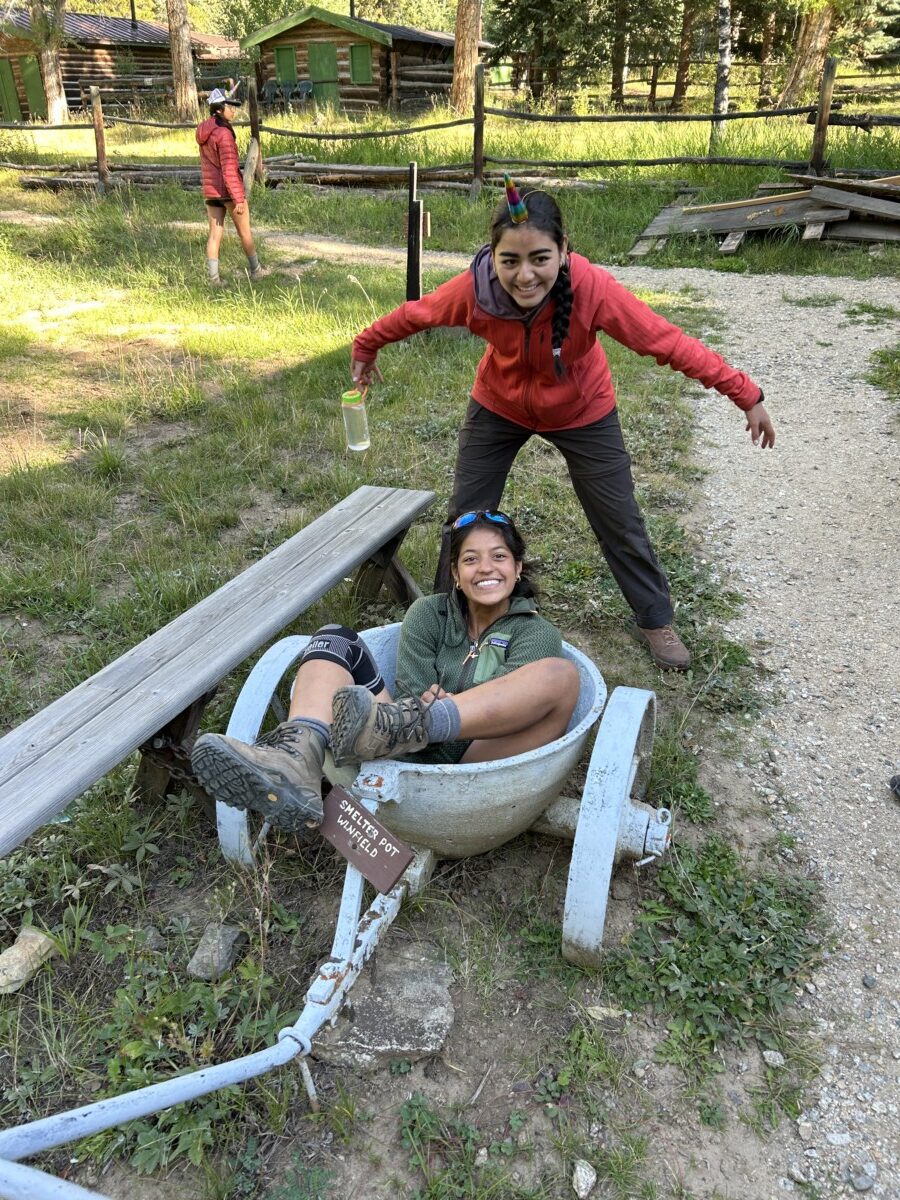
Mavis Downey:
My Growth as a Leader: an Exped Expert
Going into my first expedition, the main thing on my mind was how jacked I would be by the end of it. I had no clue that my biggest point of growth would not be quite as materialistic. Dirty, soggy, and on my last straw: that’s where I found the challenge.
As it turns out, hiking actually was not the hardest part of exped for me. Instead, I found the
greatest challenges arose from navigating relationships with my peers. These communication challenges started well before I laced my hiking boots and hit the trail with my group. I first felt them in the rations room, where we had to sort and split our meals into two groups: one for days 1-6 and the other for our re-ration, which covered days 6-14. It was the most stressful thing I have ever experienced. The challenge: with minimal instruction, sort all your food or starve. Maybe it wasn’t that dramatic, but it sure felt like it.
I immediately realized that the disconnect between my particular vision for the ration and my
peers’ faith-based method would be my biggest internal struggle. Since I was a young kid, I’ve
been the “bossy” one. At the ripe age of ten, people would tell me that I sound “like a teacher,”
and not in a good way. I was often called “stressed” and “uptight”; descriptions that reduce my
assertiveness to an insult, and still frustrate me. I did not want this reputation with my new peers,
so I stood back and just helped the group with their haphazard, mildly random method of
throwing a few ideas of meals into each bag. But in my inaction, I was just suffering in silence.
Similar situations occurred a few times over exped: whether that was when I was “Leader of the
Day” on a hike, or navigating disagreements in my cook group. Instead of stepping in and
starting the hard conversations that would benefit the group, I kept quiet, fearing judgment from
my peers. And when my assertiveness did slip through, I felt like an enemy of the state. Again,
dramatic: but that’s how it felt at times.
Slowly, I worked through my hesitation. I started speaking up more, having the difficult
conversations that no one likes having, and being more true to myself by voicing my opinions
and concerns. I now know exactly the kind of leader I want to be. The kind who commands the
room: who can artfully organize a situation and still have a good connection with the group. I’m
excited to continue building my leadership voice over the next two expeditions. I have gotten
feedback from my instructors and have reflected more on the kind of leader I’d like to be in the
future and can’t wait to apply those things to my next experiences as a leader in my community. I
know that my potential spans beyond the end of exped. I’m excited to take this feedback in my
engagements with the HMI community: to lean into confidence, unabashed by the narrow
assumptions that once bothered me.
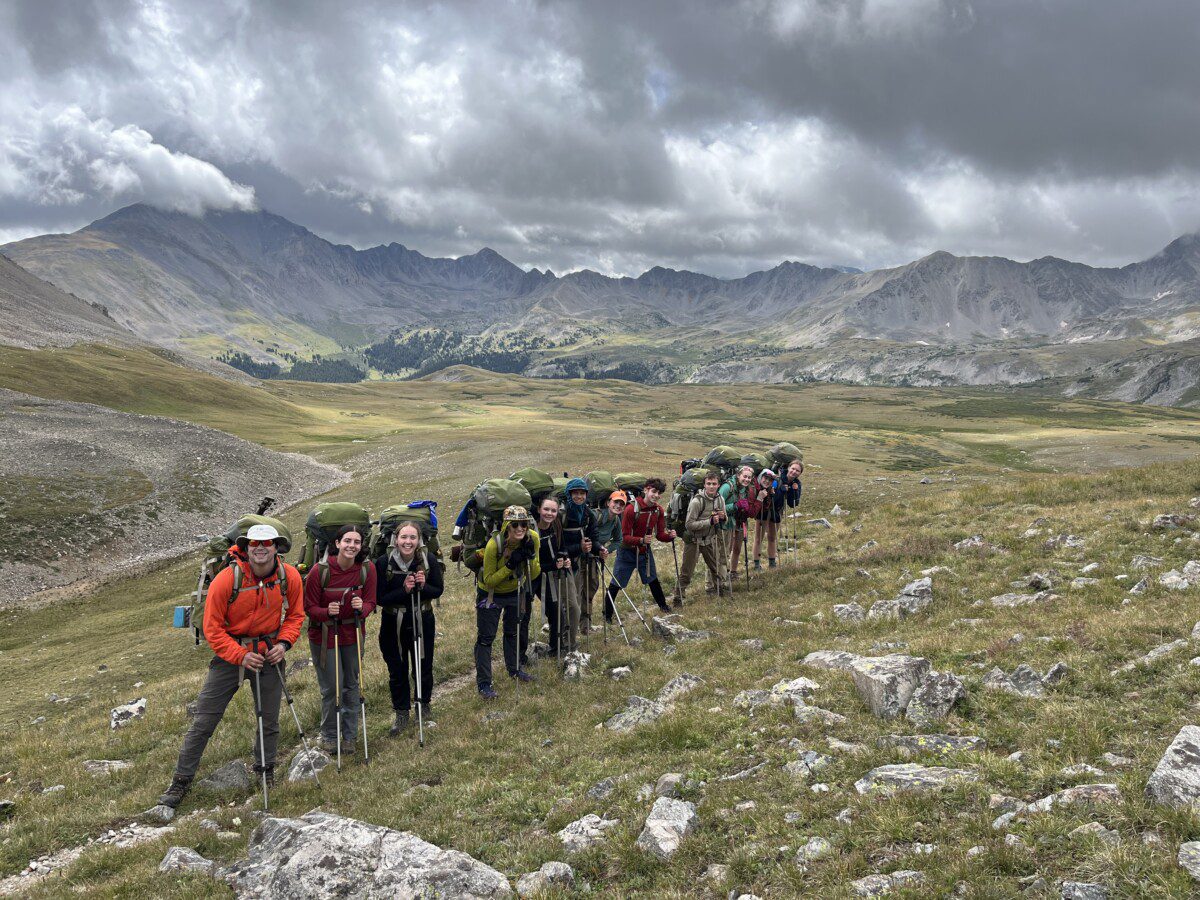
Addie Kearns:
Sticky Backcountry Cooking
I want to start with my favorite memory: getting absolutely sticky and messy from making the
best meal in the backcountry, cinnamon rolls. This memory really sticks with me because it was
such a bonding experience for me and my cook group. We woke up extra early (on a very chilly
morning) to make the dough, then let it rise. One of my favorite parts of this memory is that to let
the dough rise, you have to keep it close to your belly. So, for about an hour that morning, we all
walked around with little dough babies in our shirts! We took so many funny photos that day,
too. After the dough rose, we all sat down together and grilled up some fantastic cinnamon rolls.
This was such a fun, bonding experience for us.
Another one of my favorite parts of my days in the mountains was when we would all come
together in the Gritchen (group kitchen) and laugh and sing while we cooked yummy meals
together. This part of the expedition was so important to me because it taught me teamwork.
Everyone had to work together to have good time management and make healthy and good
meals in the backcountry. As a team, we had to really plan out our days while on expedition. We
had to make sure everyone was eating good food (especially in the mornings) but also that we
were on time for the day. We had to clearly communicate about our needs throughout the day,
and talk about how we could come together to be more efficient with cleaning and using our
ingredients well. I also learned how to get really creative and have fun in the kitchen; it was
always filled with laughter, singing, and joyful smiles.
Cooking is the most important skill I learned while in the backcountry. At HMI, they truly taught
us to keep meals healthy, simple, and absolutely delicious. I will take some extremely important
lessons away from this experience such as, clear communication, teamwork,and healthy eating.
Lastly, it taught me to laugh and sing through even the most stressful moments. Cooking is such
an important life skill and it was definitely the most joyful part of my days on expedition.
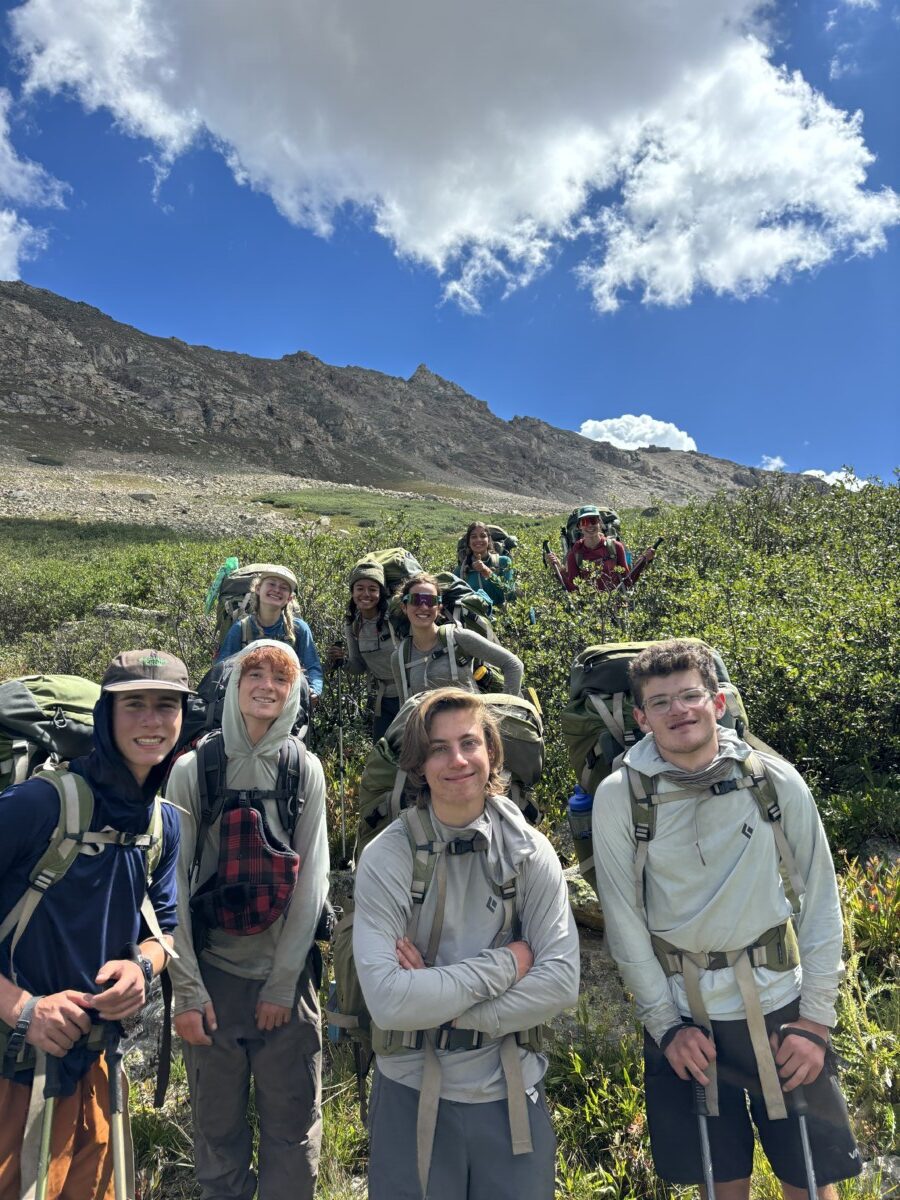
Oscar Lu:
If You Do It, I’ll Do It
Spontaneity (noun): coming or resulting from a natural impulse or tendency; without effort or premeditation; natural and unconstrained; unplanned I am a person of routine. I have a daily schedule, a daily to-do list, a calendar, etc. I am a micromanager, a perfectionist; someone who seeks order. I hate chaos; being late to class
yesterday almost gave me a panic attack.
Hi, I am Oscar, a member of HMI Semester 53 right now. I am from Los Angeles, growing up in
a loving and ambitious family of 7. Our first expedition was my first backpacking trip. As I
would find, it was a trip of many firsts. Going into the expedition, I wasn’t planning to do anything crazy. I have always been a person that takes the opportunities I can get. But mostly I was just there to find out what the hype was about, and to get to know people who are just as bold as I am for coming to HMI.
During our long, daily journeys, our instructor Jill attempted to tell the entirety of The Lord of
the Rings trilogy. We sang through the entire Hamilton playlist one by one. We took turns getting
to know each other; I could probably give an autobiography of everyone on my expedition. We
laughed, cried, and got tired together.
Every day when we would hike, one thing that kept me going was arriving at the campsite. I
dreamed of cooking a hot dinner, setting up camp, getting tucked in our sleeping bags, and most
importantly, the nightly conversations with da boyz. They got really deep. These nightly conversations went from our most embarrassing moments to our dreams and aspirations in life. Every time we would talk about our aspirations, we would circle back to one thing: the times when we had an opportunity and did not take it. This time, we decided to take our chances. Why not?
We bumped into another expedition group who told us about the cold plunges they did in the
morning. It certainly inspired us. There were resistances and ifs, but ultimately, we agreed that
“if you do it, I’ll do it”. The next morning at 6am, we jumped out of our sleeping bags shivering
cold, faces covered in frost in the 30 degree weather. We ran and jumped into the freezing water,
trying not to let our screams out as everyone else was still sleeping. It was a pleasurable feeling
of pain, but after two minutes, we jumped out and ran back to our tents.
A few days later, we were faced with another opportunity to embrace spontaneity: the choice of
whether to summit Mt. Belford, a 14er, or whether to admire it from afar. This choice was
complicated by our exhaustion; the day before had been our longest day yet: an 8 mile hike that
was almost all uphill. At night, we dragged ourselves around camp, barely cooking dinner and
going straight to bed. However, that night in our tent, we decided we would go for it. We woke
up early the next morning and summited Mt. Belford: all 14,203 feet of the peak.
Both of these experiences were spur of the moment decisions that changed the course of our
expedition. Ultimately, I would not have done these things if it weren’t for my newfound desire
to take the opportunities that arose. I’ve learned that the natural impulses to do something unplanned should not be discouraged. In fact, there is nothing wrong with pursuing these
tendencies. Sometimes, they become the most fun moments, times when I discover something I
didn’t know about myself. So I am a person of routine. I have a daily schedule, a daily to-do list, a calendar, etc. I am a micromanager, a perfectionist; someone who seeks order. But if there’s one thing that I’m taking
away from my expedition, it’s that there’s nothing wrong with letting go of perfectionism and
jumping into new experiences.
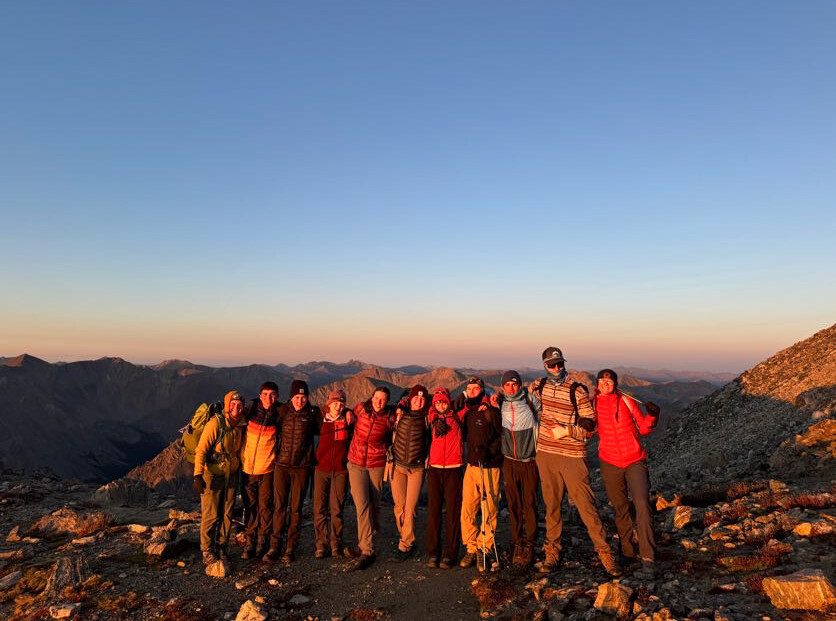
Ana Ramos Quiche:
Nights under the Stars
I wake up. Half of my body is still sleepy, yet my body tells me that it’s morning. I rise and open
my eyes. To my surprise, I’m not in my cozy bed at home or in the dorms. I quickly realize that
I’m Inside a tarp in the middle of the Sawatch Mountains outside of Leadville, Colorado. As
someone who comes from a city, waking up to the natural beauty outside of my tarp was a totally
new experience! Even when I knew that I had a long day ahead of me, the gorgeous landscapes
and sunrises motivated me to embrace the long hikes.
As someone who had no experience hiking, camping or even backpacking, the fifteen day
expedition was extremely out of my comfort zone. But I am so glad that I had the opportunity to
go on this great adventure; I connected with so many amazing people. Our days began around
6:30 am; our cook group would talk about our nights over breakfast. I was lucky enough to get to
know incredible people such as my classmates Alden and Waylon. I really appreciate Alden’s
creativity and love of music. Her creativity helped me focus on my own storytelling, boosting
my own creativity through hers. Around Alden, I could be my own authentic self knowing that I
wouldn’t be judged. Similarly, Waylon’s amazing energy made him easy to talk to. I was grateful
to connect with them both.
I also had to sleep in a small tent with two other girls which I definitely was not used to, but I’m
so glad I did. Leyla and Alden made me forget my homesickness; our tarp truly felt like my
second home. Our nightly talks reminded me of talking to my mom at home. I was able to learn a
lot from them, from playing game cards to talking about my biggest fears. Our conversations
made me feel comfortable and supported.
My journey through the Sawatch was very memorable as it was my first time experiencing a
connection with people in the outdoors. I will cherish the jokes and laughs from our expedition
group. I know that my future expeditions will be memorable as I take the lessons and
experiences that I learned on our next journey.

Luna Weiss:
Here at HMI, we go on three backpacking expeditions. They can be pretty nerve wracking at
first. Being placed in a group of seven other students I just met, and then immediately going on
an adventure that was outside of my comfort zone was a pretty intimidating experience. I was
extremely nervous going into my first expedition. But my fears quickly receded when I met my
peers, who are now some of my best friends, and my instructor team, who smoothly led the first
trip. I remember plenty of fun conversations I had with my I-team throughout my first
expedition. They went from long talks about book and movie recommendations to Q&As about
the history behind many of the places we hiked through.
These chats made even the most challenging hiking days pass by quickly, and they’ve continued
beyond our expedition. Just yesterday, my apprentice asked me to list my favorite books,
remembering a conversation we had while backpacking. We bonded over being younger sisters
and the struggles and joys that accompany sisterhood. She made me feel a lot less alone in my
insecurities, and gave me a space to fully talk about the things I had a harder time with. On one
particular morning, while camping at Halfmoon Creek, I found one of my instructors on the
riverbank doing yoga. We talked about how to take proper care of yourself while on expedition.
She gave me tips on maintaining good hygiene while in the mountains and offered me her own
hairbrush to help me feel more clean.
During Expedition, I was assigned an I-Team advisor who supported my questions, concerns
and served as my all around conversational partner throughout the trip. My expedition adviser
helped me work through parts of homework that I found challenging, encouraged me to step
outside of my comfort zone, and urged me to speak up when group decisions were being made.
He guided me through my discomfort with taking on a leadership role inside our group, helping
me prove to myself that I was completely capable of leading my peers.
By the end of the trip, I gained full trust in the faculty and apprentices. I thought of them not just
as teachers, but also as role models. Watching their confidence on and off the field and their
relationships with each other has inspired me to be a better version of myself. Now, I value
myself and my friendships with others ten times more than I did before. I am so grateful for
everything they have taught me and am excited to make more connections on my next
expedition.
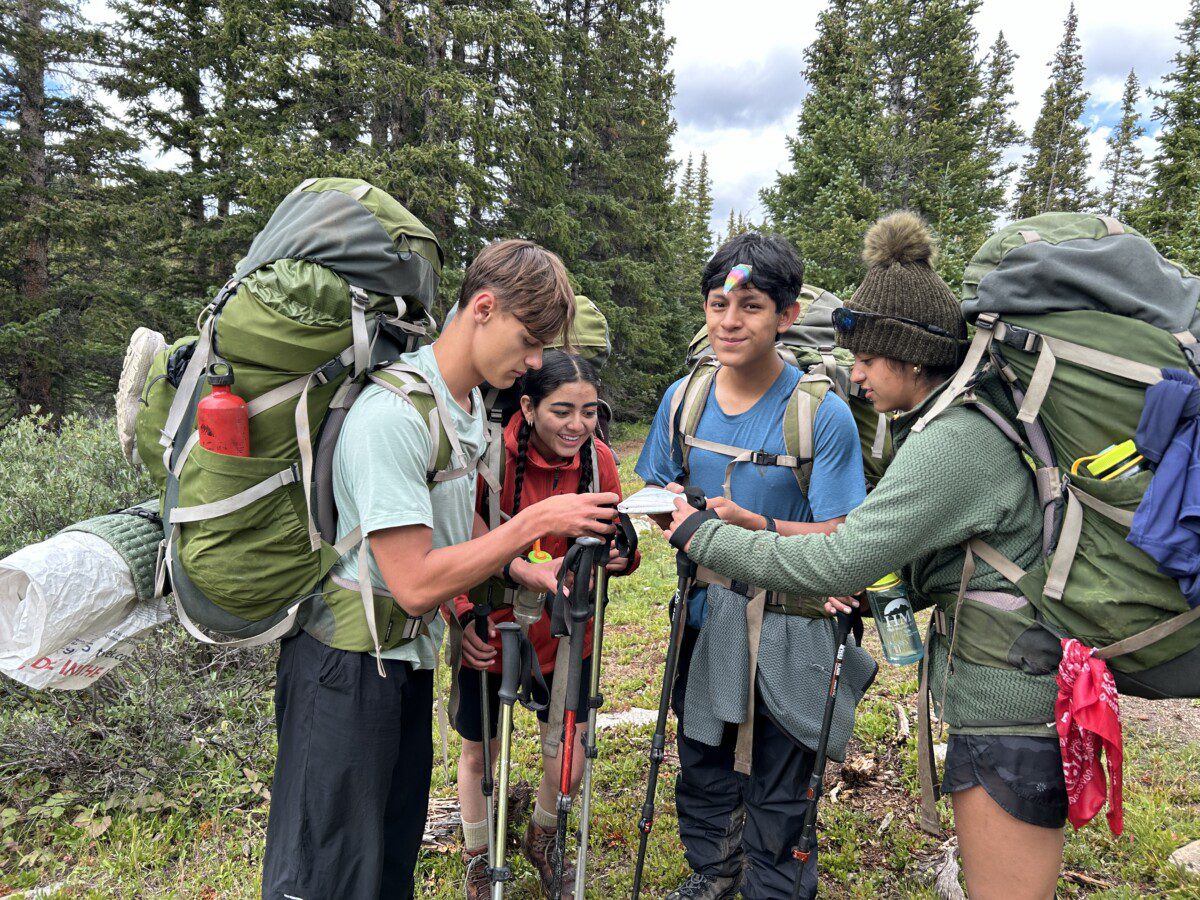
Emmy Williams:
Goats, Tall Mountains, and Important Realizations!
Fifteen days in the backcountry may be scary for some. But the time that I spent backpacking on
HMI’s first expedition four days after I arrived on campus was truly transformative. While I was
meandering through the Sawatch range, in HMI’s own backyard, I formed deep connections with
the people and nature around me. Even today, as I look out at the windows in the dining hall or
walk from building to building, I gaze out at the picturesque mountains and instantly recall
moments of laughter, learning, and perseverance.
One memory that I’m particularly fond of was an unusual disturbance of class. Around 125 lbs
and 3 feet tall, mountain goats are especially common in the Rocky Mountains. While our
expedition group was enjoying a class by the lake we were camping at, one of my classmates
spotted some goats making their way down from a nearby ridge. The mama goat and her kid
drank from the water at the other side of the lake as we watched them in awe. As soon as we
resumed class, the goats slowly started to make their way over to our circle. Eventually, they
were so close that we had to pack up our bags and move to a new location. After all, we were in
their home. It was in this moment that I realized, for the first time, that we were truly in nature.
The goats didn’t interrupt our class; our class interrupted their stroll around the lake.
Before I came to HMI, the coolest thing I had probably done was learning a complicated song on
the guitar, or nailing a new recipe. Now, I can honestly say the coolest thing I’ve ever done was
summiting Mt. Massive. Summiting Mt. Massive required three things: overnight oats, an alpine
start—waking up at two am— and an awesome group of friends and instructors. While I
definitely questioned the early morning wake-up, seeing the sunrise from above treeline is
something I would do everyday if I could. Climbing a 14,000 foot mountain is certainly no easy
task. But every time I looked behind me and saw the beautiful sky, I knew I had made the right
decision by coming to HMI. When we finally made it to the summit, I felt better than I ever had.
Nature has a peculiar ability to make me feel more at peace and powerful than anything else in
the world. As someone who often gets too caught up in deadlines, pressures, and the whirlwind
around me, when I was in the backcountry, I felt like I could finally breathe. Spending two weeks
in the woods had a medicinal impact on my mind and body, an impact that I hadn’t noticed
before I was in it for over two weeks straight. By the time I returned to HMI campus, I felt like a
calmer, happier, and more relaxed version of myself.
Now that I’m settling into the post-exped flow, I’m trying to keep the feeling of peace I find in
nature. . . But for now, I can’t wait to see what the next expedition brings. See you soon, Utah!!